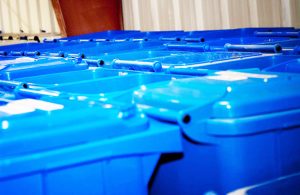
Keeping your documents secure goes beyond passwords and firewalls. Physical documents containing sensitive information can be a treasure trove for identity thieves. That’s where shredding comes in, but what exactly can you shred? Here’s a breakdown of shred-worthy items and those that should stay out of your shred bin:
Shred It Safe: These Belong In The Shred Bin
- Paper Documents: This is the bread and butter of shredding! Items such as bank statements, credit card offers, tax returns, medical records, and pay stubs should be shredded because they often contain personal information like names, addresses, Social Security numbers, or account details. These documents, if left intact, could easily be used for identity theft.
- Envelopes: Envelopes often have personal information on them, such as return addresses or account numbers. Make sure to shred those before tossing them in the recycling bin.
- Sticky Notes: Even the smallest pieces of paper can contain crucial information. If you’ve jotted down sensitive details on a sticky note, such as passwords or account numbers, it’s important to shred them. These small slips can be just as dangerous as larger documents in the wrong hands.
- Expired IDs and Passports: Old identification cards and passports should never be tossed in the trash. Shredding these documents is crucial to prevent them from being misused by identity thieves who could potentially use them to create fraudulent identities.
- Shredding Service Accepted Items: In addition to standard paper items, we do accept additional materials like CDs, DVDs, or even hard drives. These can contain vast amounts of sensitive data. Always check with your service provider beforehand to understand what items they can process and ensure all your information is thoroughly and securely destroyed.
Keep It Out: These Don’t Belong In The Shred Bin
- Plastics: Shred bins are not meant for plastic bags, credit cards, or other plastic items. These materials can damage the shredding machine and contaminate the recyclable paper. If you need to dispose of credit cards, consider using a specialized cutter designed for them.
- Food Waste: Food scraps and leftover takeout menus belong in the compost or trash, not the shred bin. Introducing food waste into the shredder can attract pests and create a mess.
- Liquids: Shredders are not designed for any liquid. Introducing liquids can cause electrical hazards and damage the internal components of the shredding machine.
- Metals: Metal objects like binder clips (in large quantities) or paper clips (in excess) can jam the shredder. Removing any metal attachments from documents before shredding is advisable to ensure smooth operation.
- Electronics: While some shredding services accept hard drives for secure disposal, most electronics require specialized disposal methods. Improper disposal of electronics can lead to data security risks and environmental harm. Always check with your local electronics recycling center for proper guidance.
Additional Tips For Secure Shredding
Regular Shredding Routine
Establish a regular shredding schedule to ensure sensitive documents don’t pile up and become a security risk. Regularly shredding documents as they become obsolete helps maintain ongoing security and reduces clutter.
Educate And Train Employees
Ensure that everyone in your workplace understands the importance of shredding and knows which items need to be shredded. Training sessions or clear guidelines can prevent accidental disposal of sensitive information.
Secure Storage Before Shredding
To ensure the security of sensitive documents awaiting shredding, it is advisable to store them in a designated safe location. Utilizing locked bins or containers can effectively prevent unauthorized access to records that are pending destruction, safeguarding the confidentiality and privacy of the information contained within. This practice not only helps maintain data integrity but also mitigates the risk of potential breaches or leaks, promoting a secure document disposal process.
Verify Shredding Service Credentials
If you use a third-party shredding service, verify its credentials. Ensure it is certified by recognized industry standards (such as NAID AAA Certification) to confirm that it follows strict protocols for the secure destruction of documents.
Environmentally Friendly Disposal
Many shredding services offer recycling options, and you can check with your local recycling program for guidelines on processing shredded paper. This environmentally conscious step helps reduce waste and promote sustainability.
By following these additional tips, you can enhance the security of your shredding process and protect your personal or business information from falling into the wrong hands. Confidential Security Corporation (CSC) is a professional company that provides secure document destruction and paper shredding services in Illinois. CSC is proud to be NAID AAA Certified through iSIGMA, ensuring secure and compliant destruction of sensitive documents. Contact us today to learn more about our services and how we can help you maintain the highest level of security for your confidential information.

